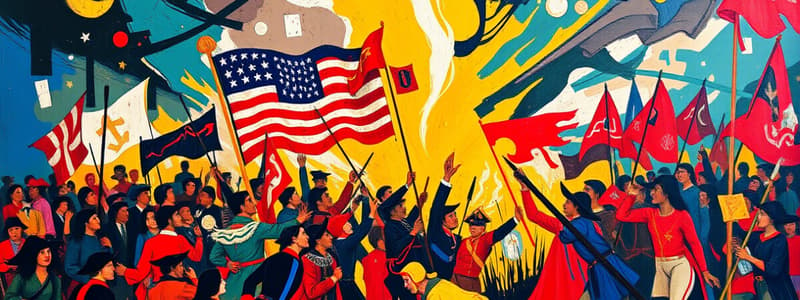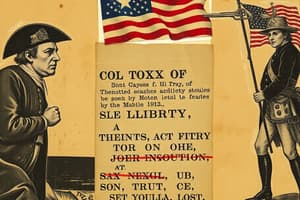Podcast
Questions and Answers
What was a primary cause of colonial unrest during the revolution?
What was a primary cause of colonial unrest during the revolution?
- Expansion of British territory
- Legal recognition of slavery
- Taxation without representation (correct)
- Increased land grants
Which event directly escalated tensions between British soldiers and civilians in Boston?
Which event directly escalated tensions between British soldiers and civilians in Boston?
- First Continental Congress
- Boston Tea Party
- Boston Massacre (correct)
- Formation of the Sons of Liberty
The Intolerable Acts were a response to which colonial protest?
The Intolerable Acts were a response to which colonial protest?
- Stamp Act protests
- Sugar Act resistance
- Boston Tea Party (correct)
- First Continental Congress
What philosophical movement influenced the attitude of colonists towards governance?
What philosophical movement influenced the attitude of colonists towards governance?
What was the main purpose of the Sugar Act of 1764?
What was the main purpose of the Sugar Act of 1764?
Which body was formed in response to the Intolerable Acts to promote unity among the colonies?
Which body was formed in response to the Intolerable Acts to promote unity among the colonies?
What was one of the primary actions taken by the Sons of Liberty in resisting British policy?
What was one of the primary actions taken by the Sons of Liberty in resisting British policy?
What was one of the effects of boycotting British goods by the colonists?
What was one of the effects of boycotting British goods by the colonists?
Which factor contributed to the formation of a shared American identity among the colonies?
Which factor contributed to the formation of a shared American identity among the colonies?
What was a primary tactic used by colonists to oppose British taxation?
What was a primary tactic used by colonists to oppose British taxation?
The Tea Act of 1773 primarily aimed to benefit which group?
The Tea Act of 1773 primarily aimed to benefit which group?
What action did the colonists take in response to the Intolerable Acts?
What action did the colonists take in response to the Intolerable Acts?
Which event marked the beginning of armed conflict in the American Revolution?
Which event marked the beginning of armed conflict in the American Revolution?
What was a consequence of the Stamp Act imposed in 1765?
What was a consequence of the Stamp Act imposed in 1765?
What was the primary frustration of colonists regarding the Navigation Acts?
What was the primary frustration of colonists regarding the Navigation Acts?
The Boston Massacre of 1770 resulted primarily from what underlying issue?
The Boston Massacre of 1770 resulted primarily from what underlying issue?
Study Notes
Causes of the Revolution
- Taxation Without Representation: Colonists opposed British taxes imposed without their consent, believing they should not be taxed by a government where they had no political representation.
- Boston Massacre (1770): Conflict between British soldiers and Boston civilians resulted in the death of five colonists, fueling anti-British sentiments.
- Boston Tea Party (1773): Protest against the Tea Act where colonists dumped tea into Boston Harbor, demonstrating their resistance to British control and taxation.
- Intolerable Acts (1774): Series of punitive laws passed to punish Massachusetts for the Boston Tea Party, leading to increased colonial unrest.
- Enlightenment Ideas: Philosophical movements emphasizing natural rights, liberty, and democracy influenced colonial attitudes towards governance.
Key Events and Acts
- Sugar Act (1764): Tax on sugar and molasses aimed at reducing smuggling and increasing revenue for Britain.
- Stamp Act (1765): Required colonists to purchase special stamped paper for legal documents and newspapers, inciting widespread protests.
- Declaratory Act (1766): Asserted Britain's right to legislate for the colonies in all cases, further angering colonists.
- Townshend Acts (1767): Series of taxes on everyday items, leading to boycotts and heightened tensions.
- First Continental Congress (1774): Colonial delegates met in response to Intolerable Acts, promoting unity and resistance against British policies.
Colonial Responses
- Formation of Sons of Liberty: Secret organization formed to resist British policies through protests and acts of civil disobedience.
- Committees of Correspondence: Networks established to facilitate communication among colonies and coordinate resistance efforts.
- Boycotts: Colonists organized boycotts against British goods, significantly impacting British trade and economy.
- Militia Formation: Colonists began organizing local militias in preparation for potential conflict with British forces.
- Common Sense (1776): Thomas Paine's pamphlet advocating for independence from Britain, swaying public opinion towards revolution.
Causes of the Revolution
- Taxation Without Representation: Colonists argued that taxation imposed by the British government was unjust as they lacked representation in Parliament, fueling resentment.
- Boston Massacre (1770): Tensions escalated between British troops and Boston residents, culminating in an incident where five colonists were killed, deepening anti-British feelings.
- Boston Tea Party (1773): This act of rebellion saw colonists protest against the Tea Act by throwing a significant quantity of British tea into Boston Harbor, showcasing their defiance against taxation.
- Intolerable Acts (1774): A series of harsh laws imposed in retaliation for the Boston Tea Party, which intensified dissent and organized resistance among the colonies.
- Enlightenment Ideas: Intellectual movements promoting concepts such as individual rights and democratic governance played a crucial role in shaping colonial views on independence and self-rule.
Key Events and Acts
- Sugar Act (1764): Aimed at curbing smuggling, this tax imposed levies on sugar and molasses, which angered many colonists and marked the beginning of colonial opposition.
- Stamp Act (1765): Mandated that colonists buy specially stamped paper for documents, triggering widespread protests and the rallying cry of "no taxation without representation."
- Declaratory Act (1766): Asserted Britain's authority to legislate for the colonies in all matters, which heightened colonial distrust of British intentions.
- Townshend Acts (1767): Introduced taxes on goods such as glass and tea, prompting boycotts and increased agitation against British economic policies.
- First Continental Congress (1774): Convened by delegates from twelve colonies as a response to the Intolerable Acts, this assembly sought to unify colonial resistance against Britain.
Colonial Responses
- Formation of Sons of Liberty: This secretive group actively opposed British measures through demonstrations and was instrumental in organizing resistance efforts.
- Committees of Correspondence: Established to improve inter-colonial communication, these committees played a key role in coordinating protests and sharing revolutionary ideas.
- Boycotts: The colonies collectively organized boycotts against British products, effectively damaging British trade and pressuring Parliament to reconsider its policies.
- Militia Formation: In anticipation of armed conflict, colonists began forming local militias to prepare for potential confrontations with British troops.
- Common Sense (1776): This influential pamphlet by Thomas Paine argued for independence from Britain, swaying public sentiment and serving as a catalyst for revolutionary thought.
Impact On American Independence
- Enlightenment ideas emphasized liberty and individual rights, serving as ideological foundations for colonial resistance.
- Shared grievances against British policies, such as taxation and lack of representation, cultivated a unified American identity among the colonies.
- Political activism surged, leading to the formation of influential groups like the Sons of Liberty, which organized resistance efforts.
- Discontent in the colonies prompted international support from foreign powers, particularly France, aiding the American cause.
Colonial Responses
- Colonists launched widespread protests and organized boycotts of British goods, challenging the principle of taxation without representation.
- The First and Second Continental Congresses were established to unify colonial responses and strategy against British actions.
- Committees of Correspondence were formed, enhancing communication and coordination among the colonies in their resistance movements.
- In response to escalating British aggression, colonists organized militias to prepare for potential armed conflict.
Key Events And Acts
- The Stamp Act of 1765 imposed the first direct tax on colonies, igniting protests that ultimately led to its repeal.
- The Boston Massacre in 1770 involved a violent confrontation between British soldiers and civilians, resulting in multiple deaths and increased tensions.
- The Tea Act of 1773 allowed the British East India Company to sell tea at lower prices, inciting the Boston Tea Party as a direct protest.
- The Intolerable Acts of 1774 constituted a series of punitive measures imposed by Britain, further galvanizing colonial unity against perceived oppression.
- The battles of Lexington and Concord in 1775 marked the initiation of armed conflict, representing the first military engagements of the American Revolution.
Causes Of The Revolution
- Taxation without representation generated deep resentment among colonists towards the British Parliament's authority over them.
- British trade restrictions, enforced through laws like the Navigation Acts, eroded colonial economic independence and fueled frustration.
- Enlightenment theories advocating for natural rights and principles of self-governance significantly influenced revolutionary sentiments.
- A burgeoning colonial identity emerged, characterized by cultural differences and a growing sense of autonomy from British rule.
- The permanent stationing of British troops in the colonies escalated tensions and fears among colonists regarding potential oppression.
Studying That Suits You
Use AI to generate personalized quizzes and flashcards to suit your learning preferences.
Description
Explore the key causes behind the American Revolution, including taxation without representation, the Boston Massacre, and Enlightenment ideas. This quiz covers significant events and acts that fueled the colonists' desire for independence from British control.




